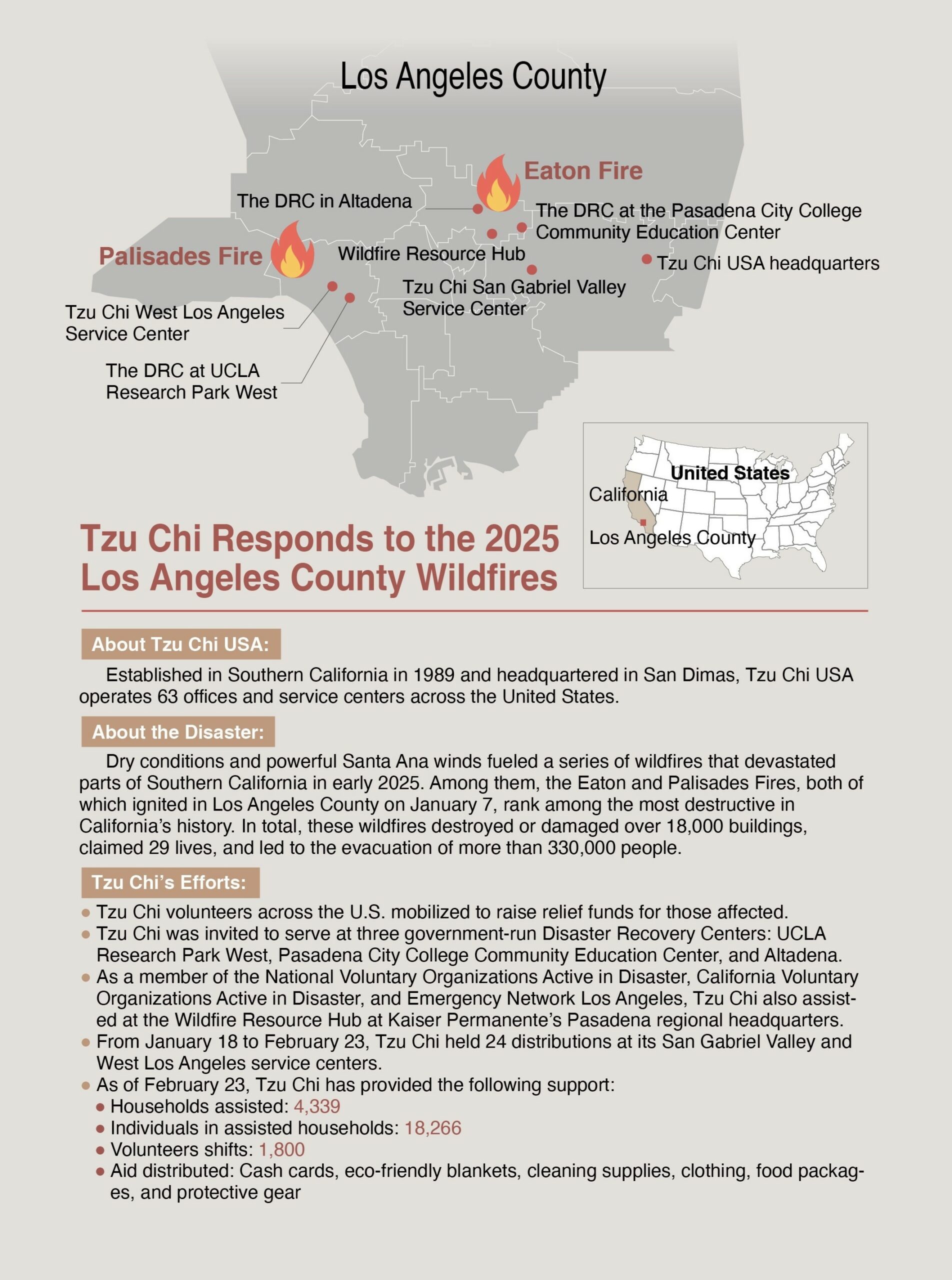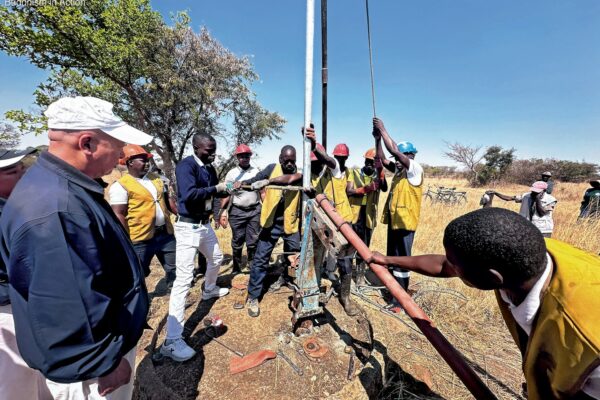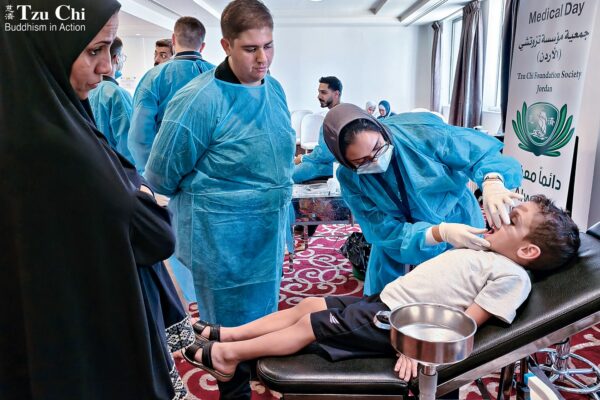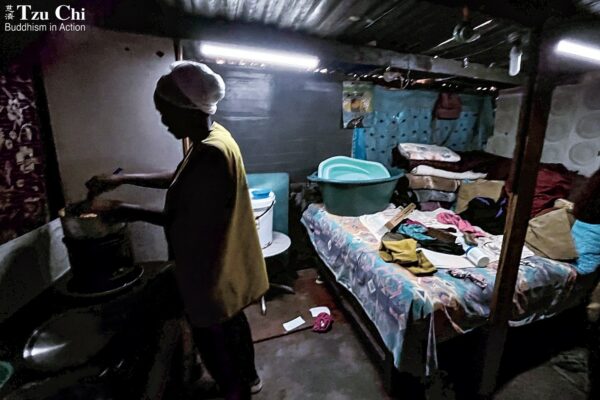Compiled by Tzu Chi Monthly editorial staff
Edited and translated by Wu Hsiao-ting
Photos by Jamie Puerta
As Southern California’s wildfires left thousands displaced, Tzu Chi volunteers offered cash cards, comfort, and care to help survivors navigate the challenges of recovery.
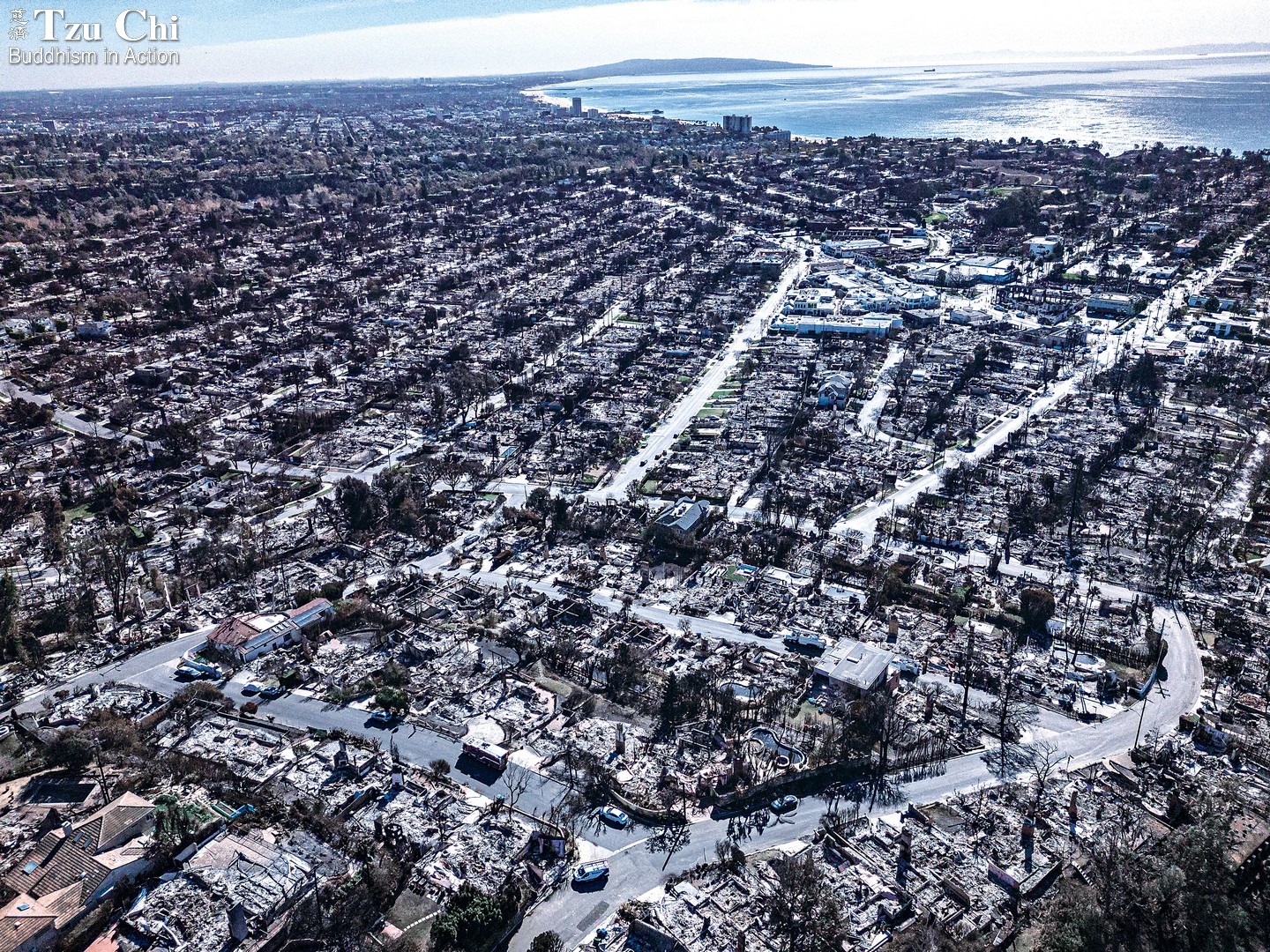
The once-picturesque coastal community of Pacific Palisades lies in ruins after the Palisades Fire in Los Angeles County. Borja Campillo
In the second week of January 2025, a series of ferocious wildfires erupted in Southern California, the United States, fueled by dry conditions and hurricane-force Santa Ana winds. Los Angeles County was hit particularly hard, with the Palisades Fire and the Eaton Fire among the most severe. These wildfires were not fully contained until the end of the month, by which time more than 18,000 structures had been destroyed or damaged. Many residents had little to no time to gather their belongings before evacuating, and upon their return, found their homes reduced to ashes.
On January 14, the Federal Emergency Management Agency (FEMA) set up two Disaster Recovery Centers (DRCs) in Los Angeles County to coordinate relief efforts. The two centers brought together government agencies, insurance and legal services, and non-governmental organizations to assist survivors. For instance, those who lost birth certificates, marriage licenses, or passports could apply on-site and receive free replacements within 15 to 20 minutes. Crowds at the DRCs were understandably large.
Los Angeles County spokesperson Brenda Duran explained that the DRCs integrated county, state, and federal agencies with nonprofits to connect survivors to essential resources. Nonprofits provided essential support such as housing assistance and clothing to help displaced individuals rebuild their lives.
Tzu Chi USA was among the nonprofits serving there. Volunteers registered applicants for cash card assistance, using data from the LA County Recovers website to verify damage based on fire department findings. Tzu Chi USA headquarters then conducted assessments to determine aid amounts.
Survivors who registered at the DRCs or online and were approved received a text notification from Tzu Chi in the following days, informing them of the aid distribution date and location. Each household received between 1,000 and 1,500 U.S. dollars in assistance.
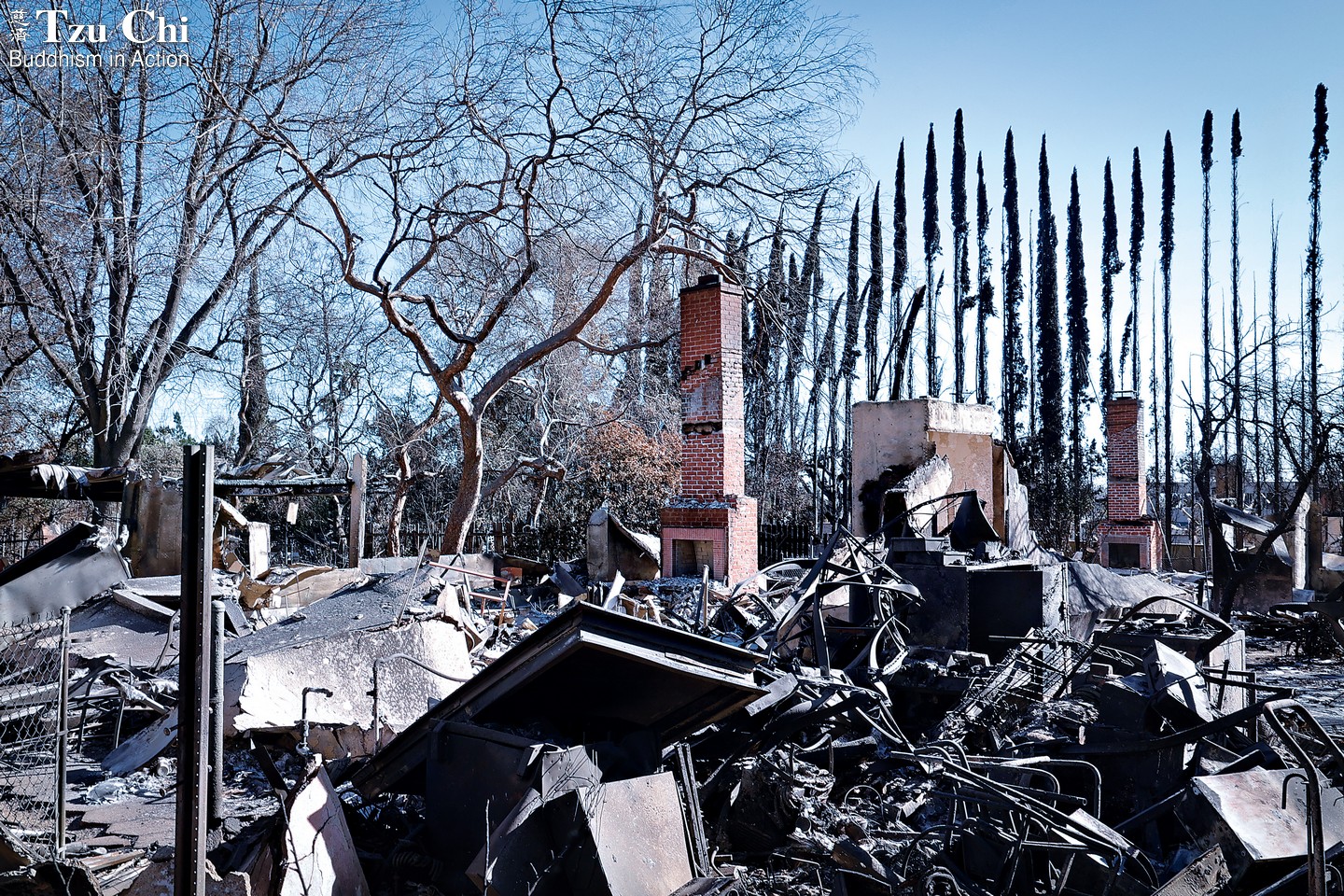
Only red brick fireplaces remain standing in this photo taken in Altadena. The fires left behind debris and soil contaminated with toxic substances, necessitating clearing and remediation. Luo Shu-li
Part of the mainstream aid system
The Eaton Fire burned about a 30-minute drive north of Tzu Chi’s San Gabriel Valley Service Center in El Monte. Beginning January 8, volunteers visited multiple shelters housing displaced residents and delivered water and meals to families in nearby areas affected by power outages.
Tzu Chi volunteers provided more than 11 hours of daily service to survivors at the Disaster Recovery Centers once they had been established. Tzu Chi USA CEO Debra Boudreaux (曾慈慧) explained that Tzu Chi’s presence in the United States for over 35 years has allowed the organization to establish deep roots and long-term engagement. “Tzu Chi has become part of the mainstream American relief system, sharing administrative resources and providing vital non-governmental aid,” she stated.
Starting January 18, Tzu Chi distributed cash cards and relief supplies at its San Gabriel Valley and West Los Angeles service centers. By February 23, volunteers had completed 24 distributions.
To accelerate relief efforts, Tzu Chi, a long-standing member of the National Voluntary Organizations Active in Disaster (NVOAD), also joined the Wildfire Resource Hub organized by California VOAD. For six consecutive days starting on January 27, Tzu Chi’s volunteer team worked at the Hub at Kaiser Permanente’s Pasadena regional headquarters, alongside organizations including the American Red Cross and the Salvation Army.
Long lines of people in need queued at the Hub on its very first day of operation. Unlike the government-run DRCs, charitable organizations at this location could directly distribute aid. In addition to issuing cash cards, Tzu Chi set up a booth on the first floor, offering eco-friendly blankets and vegetarian boxed meals. A Tzu Chi Vision Mobile Clinic also provided free eye exams and prescription glasses. Tzu Chi USA Medical Foundation Executive Vice President Steven Voon (溫俊強) explained, “Many people lost their glasses in the fires, so we’re helping them maintain their ability to work and go about their daily lives.”
Meanwhile, volunteers assessed damage in hard-hit areas. On January 20, they visited Altadena, where the Eaton Fire had left countless structures in ruins. The National Guard had initially guarded the perimeter to prevent looting, allowing only utility workers, emergency responders, insurance investigators, and media personnel to enter. Even residents were prohibited from accessing their properties.
The devastation was worse than expected—business districts, gas stations, and schools had burned to the ground or were in ruins. Once-green vegetation had been reduced to charred remains, and the air was thick with lingering ash and harsh chemical odors. Even homes that had survived were uninhabitable due to the destruction of public infrastructure and soil contamination.
One survivor told volunteers, “Starting over is incredibly difficult. Sometimes, we don’t even know what we need. When people ask how they can help, all I can say is, ‘I don’t know…’”
Crowds quickly gathered at the Disaster Recovery Center in Pasadena when it opened on January 14. Luo Shu-li
Tzu Chi volunteers helped applicants register for cash cards, using data from the LA County Recovers website to determine damage levels: red icons indicated total destruction, yellow for 25 percent damage, and green for less than 10 percent damage. Qian Mei-zhen
Gaining strength
Sixty-three-year-old Larry Demula rode his bicycle for two hours to reach Tzu Chi’s San Gabriel Valley Service Center, where he came to collect aid. On January 7, his 60-year-old wife had just been discharged from the hospital after a surgery. That night, they were abruptly woken by chaotic sounds and the smell of smoke. Seeing flames erupt on the ceiling, he grabbed his immobile wife and fled. He tried to return to salvage some belongings, but their house was already engulfed in flames. Their car had likewise been destroyed. He had no choice but to call an ambulance to take his wife to the hospital.
Since that day, Demula had been staying at the hospital with his wife, awaiting her second surgery. He had tried going to a shelter, but those closer to the hospital were already full, and nearby rental options were either too expensive or unavailable. He said they were still looking for a place on their own to live in.
Each household that arrived at a Tzu Chi distribution brought with it a heartbreaking story of loss: retirees who had saved their entire lives for a home, only to see it reduced to ashes; a family of five who lost their rental home and were now living in a friend’s garage; a couple who had just immigrated from Taiwan, buying a home near their daughter to care for their grandchildren—only for both homes to be destroyed in the blaze.
Survivors shared before-and-after photos of their homes as volunteers deeply empathized with their loss. Amid the uncertainty, survivors found solace in warm embraces and comforting words. Tears were dried, and a renewed sense of courage emerged to face the future.
Lisa Maier, a resident of Pacific Palisades, one of the hardest-hit areas, kept wiping away tears after arriving at Tzu Chi’s West Los Angeles Service Center. Overwhelmed by the volunteers’ compassion, she said, “Somebody gave me five hugs in a row. You can’t beat that, right?” The volunteers reassured her that she was not alone and that they were there to support her. Reflecting on the aftermath of the disaster, she added, “We’ve seen generosity like I never would have expected.”
At the same Tzu Chi venue, Joanna Curtis, who was staying in a hotel with her family while arranging housing, said she already had plans for the cash card she received—she intended to buy beds and pillows for her children. Since their home had been destroyed, she had been doing her best to create a sense of normalcy for them.
Curtis’s mother, Nancy Niles, observed that the Tzu Chi application process was straightforward and easy to follow, with a quick response. She also found the venue warm and welcoming, with even the thoughtful touch of refreshments.
Claire Dorotheo’s partner and his son had lived in Altadena for over 15 years, and she moved in with them in September 2024. She had hoped to put down deep roots there—to grow old in that community. But the fire changed everything. Receiving aid at Tzu Chi’s San Gabriel Valley Service Center, she said, “The sense of community that I feel here is probably the biggest thing that I have received. I feel the love of everybody. There are good people here that want to help, and that’s real. Love is real.”
After completing registration and having their housing damage verified by Tzu Chi, affected residents received a text notification and arrived at a Tzu Chi venue to collect cash cards, cleaning supplies, food, and other essentials. Luo Shu-li
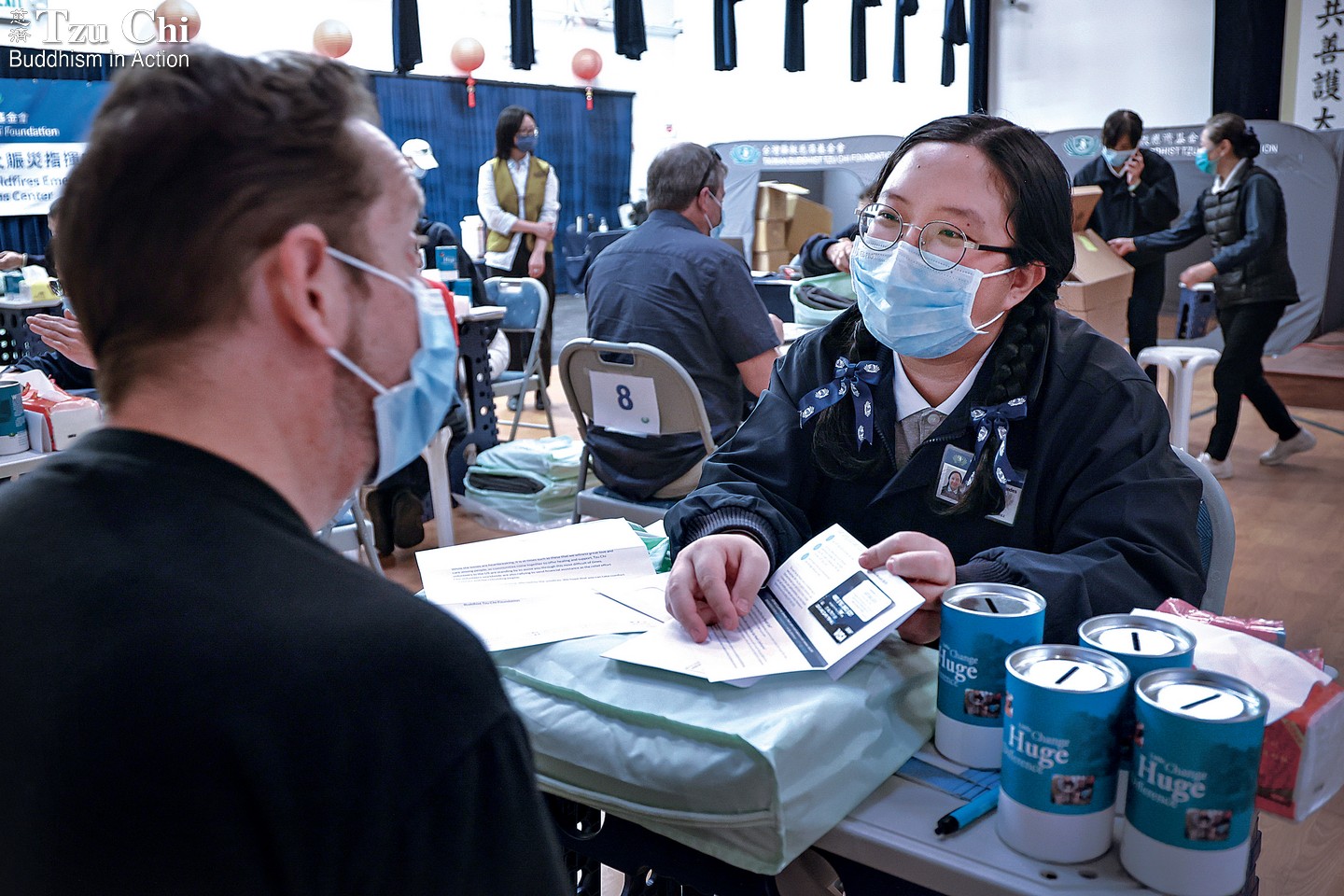
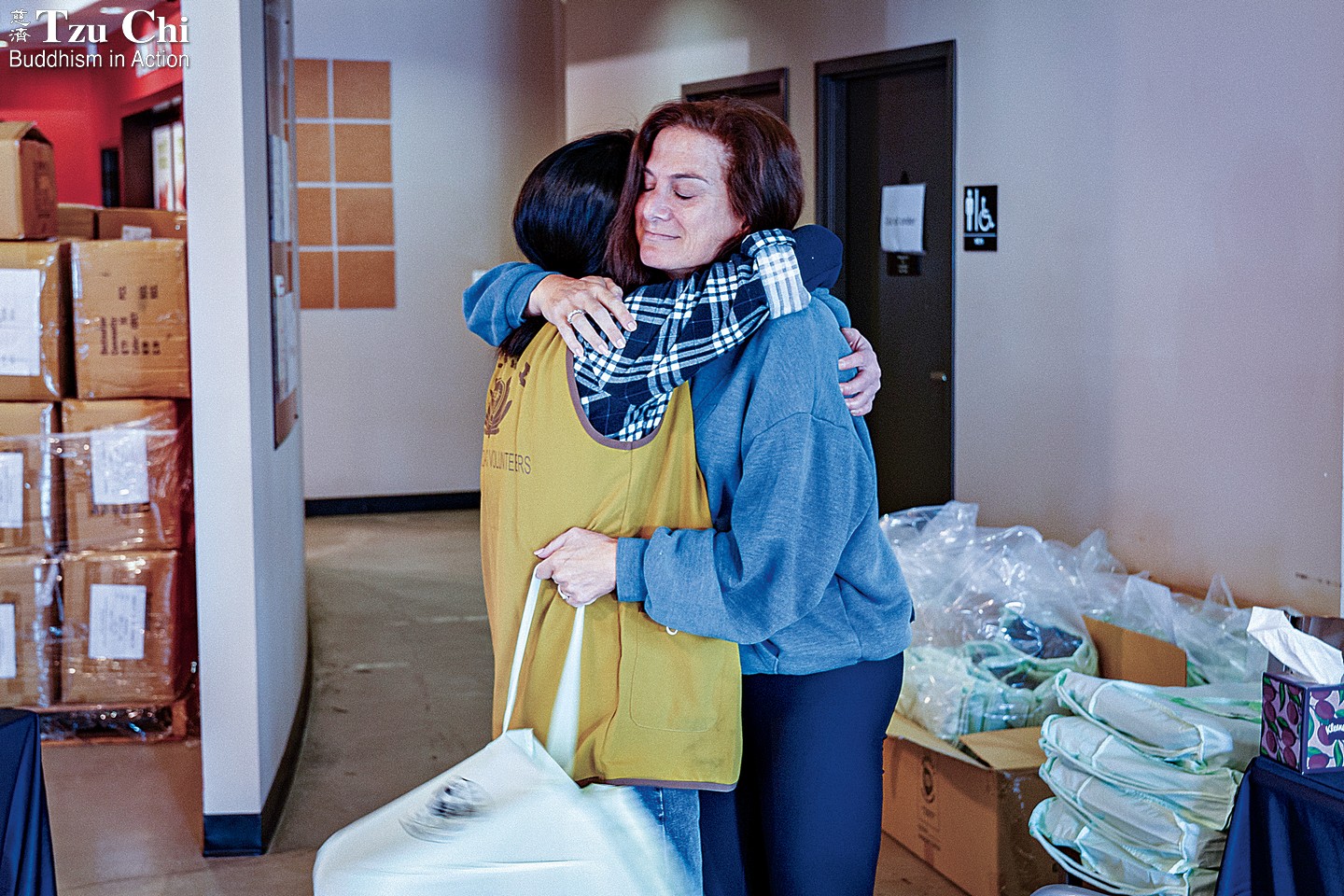
A volunteer embraces an aid recipient.
Long road to recovery
Altadena residents Norman Merino, 70, and his wife lived in a house that, according to their insurance company, was not in a high-risk zone and sat just one block from the fire station. Yet, the wildfire still destroyed their house. Merino estimated that the chance of this happening was probably only one percent, but unfortunately, they were among the unlucky ones.
He recalled that they received a call from a neighbor two blocks away on that fateful night, at 3:30 a.m., urging them to evacuate quickly. They grabbed a few belongings and fled within 30 minutes. Later, however, they learned that an 80-year-old woman had slept through the whole thing and had been left behind. Merino and a neighbor returned to pick her up. “We got her, put her in the truck,” Merino said, his voice catching with emotion, “and as we were doing that, every few seconds, you heard an explosion. The neighborhood was on fire; the whole street was going up in flames.”
Merino expressed deep sadness, explaining that he and his wife had lived in their community for over 15 years and felt a strong connection to it. The restaurant where they first met had also burned to the ground. While others saw it as just a burger place, it was much more to him and his wife. It was where they celebrated their anniversary every year.
Despite his losses, he was impressed by the relief services provided by Tzu Chi. He had visited other organizations, where the response was simply, “Sorry for your loss.” But at Tzu Chi, he felt genuine support. “I think they have been more supportive than a lot of other groups or government agencies,” he said. “The woman who checked me in was just so nice. Here, there was a sincerity and a bond. I think it’s just amazing.” Merino hoped to give back to Tzu Chi in the future. If his circumstances improved, he knew exactly where he’d donate.
The wildfires in Southern California scorched approximately 233 square kilometers (90 square miles) in January—an area roughly one-fifth the size of Los Angeles. Before large-scale reconstruction can begin, the debris and ash must first be cleared, followed by soil and environmental decontamination. Debra Boudreaux remarked, “It will be a long road, and residents may need [to wait] five to seven years before they can return home.”
Tzu Chi plans to continue providing assistance, identifying those in further need through its aid distribution data and offering mid- to long-term care. “We will accompany them as long as necessary, until they are able to stand on their own,” said Boudreaux.
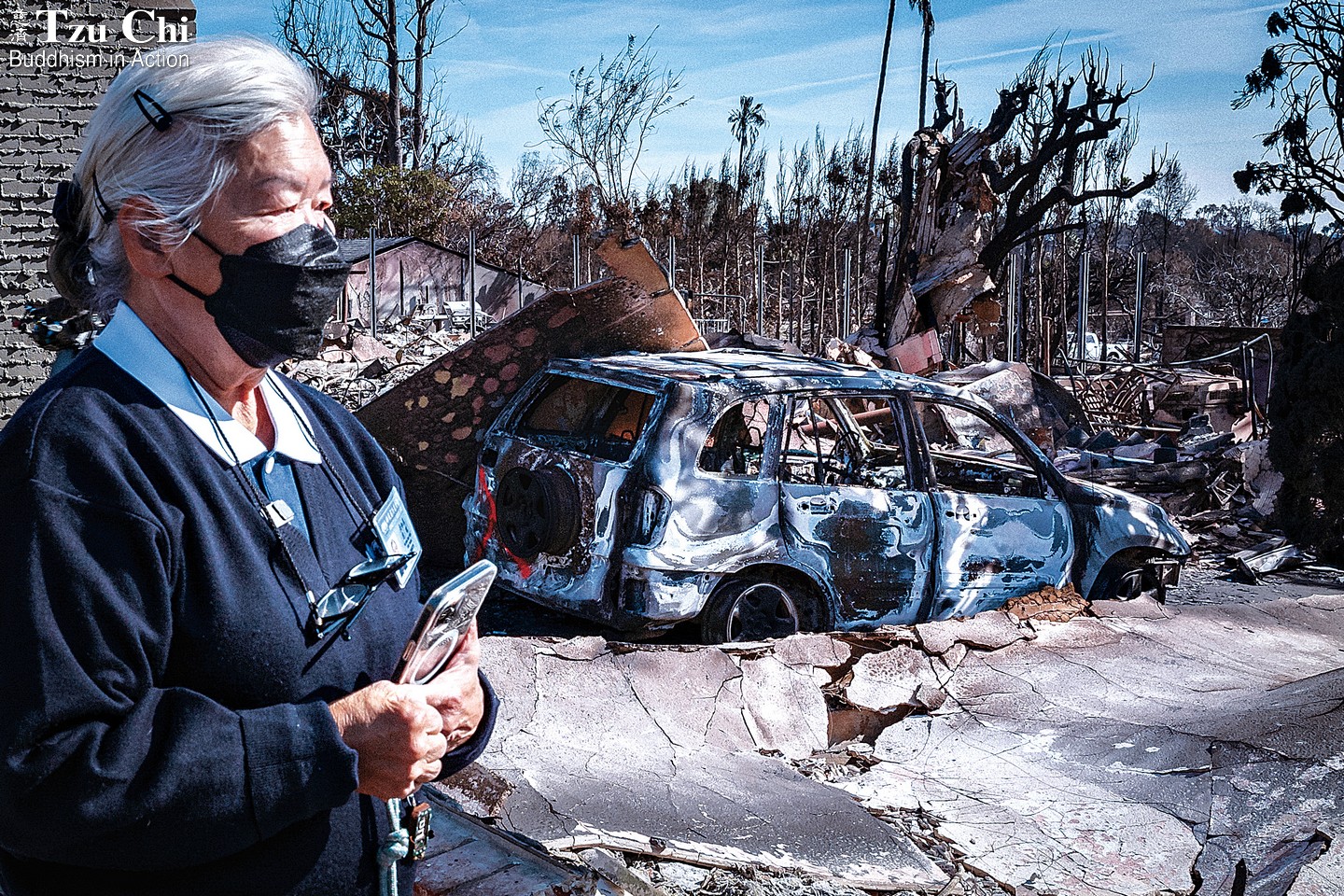
After access restrictions to her neighborhood were lifted, Tzu Chi volunteer Flora Yeh returned to her home of 44 years and was overwhelmed with emotion.
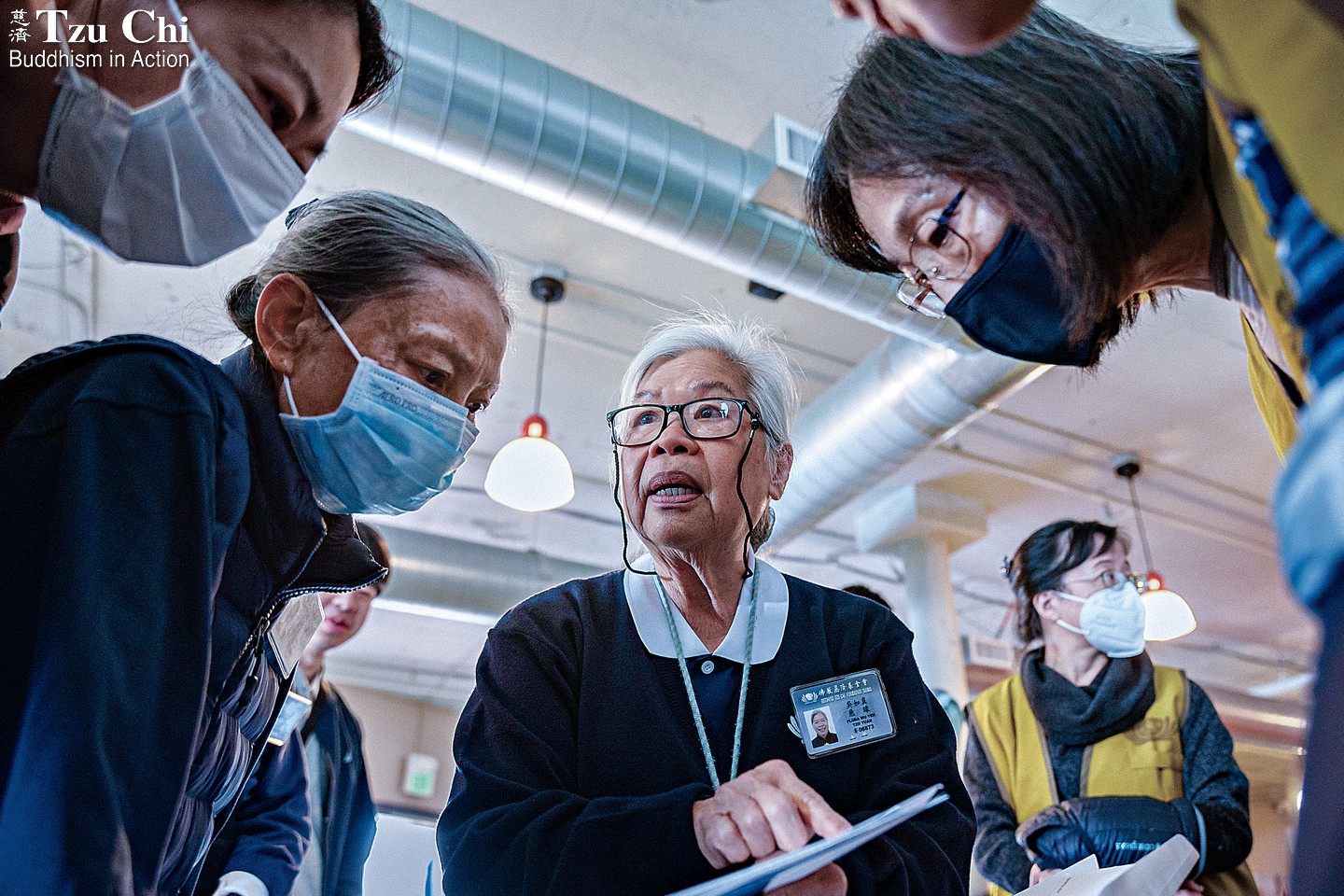
Despite her loss, she remained committed to her volunteer work, assisting with distribution efforts alongside fellow volunteers.
Hope amidst ashes
During the Chinese New Year period, 23 Tzu Chi volunteers from Canada covered their own expenses to travel to Los Angeles County and serve at the Wildfire Resource Hub in Pasadena, where they provided support for about a week. Eight additional volunteers from New York and Boston flew in to join them. They left for the Hub every morning at 7 and often didn’t return to their accommodations until after 9 p.m. Seventy-five-year-old Flora Yeh (吳如真), head of Tzu Chi’s West Los Angeles Service Center, was deeply involved throughout the effort.
“When we were registering survivors, some broke down in tears, saying their homes had been completely destroyed,” she said. “I comforted them, telling them that mine was too. They looked at me in shock and asked how I managed to cope—where did I find the strength?”
Yeh and her husband lived in Pacific Palisades. On the morning of January 7, when they left their house, they were unaware that by midday their neighborhood would become a restricted zone, with even homeowners unable to return. Later, a neighbor who had evacuated in haste sent her a video of the raging fire—her home was engulfed in flames.
Eighteen days after the fire, Yeh was finally able to return to see the ruins. Standing amidst the devastation, she could no longer hold back her grief. “This had been my home for 44 years,” she said, her voice breaking. “I had seen post-disaster photos and heard people describe the damage, but seeing it firsthand is still overwhelming.”
Yet amid the destruction, one thing remained. “The only thing still standing is my Buddha,” she said. “It was a gift from a friend, and I placed it in my yard to protect my family.” The small statue, covered in ashes, remained intact, its serene expression unchanged. Seeing it brought a smile to her face.
Yeh has been a Tzu Chi volunteer for nearly 30 years. She reflected that during home visits to the needy, she had often met people who had faced sudden misfortunes, and she learned from them how they had coped. “This time, I’m experiencing impermanence firsthand,” she said. “I feel I should channel this experience into strength to help other survivors, because I truly understand their suffering. By comforting them, I also find some relief for my own pain.”
She added that in the face of sudden misfortune, it’s natural to ask, “Why me?” But now, she could tell the other survivors, “We are all in this together. Since we are in the same boat, we should stand up and work for our community, contributing what we can.”
Tzu Chi’s rapid relief efforts and meaningful assistance resonated with many, prompting businesses and long-established Asian American NGOs in Southern California to donate. Volunteers across the U.S. also mobilized, braving freezing temperatures to fundraise for reconstruction.
As survivors navigate the long road to recovery, the compassion and solidarity of volunteers provide strength and hope. Though rebuilding homes and communities will take years, kindness exchanged in moments of hardship fosters resilience. In the face of devastation, the warmth of human connection serves as a source of hope, reminding all that even after great loss, new beginnings are possible.
This sentiment was echoed by Wylda Faye, who, while attending a Tzu Chi distribution, shared how volunteers had reassured her that there is goodness in the world—that people care, regardless of the circumstances. A person of faith, she expressed her belief: “There is going to be a better tomorrow. It looks a little foggy, but it’s going to be better.”
